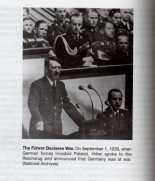
Blood Is Thicker Than Water-Part I
In order to understand anything, perhaps more especially war; we have to go back to the beginning, the root, the genesis. Due to where I want to go with this series, we can’t start that far back. So we will glimpse at the end of Word War I and drive quickly into the beginning of World War II.
Though I want to concentrate on the Pacific side of things during World War II, let’s journey there first.
Most historians agree that the Treaty of Versailles’ catastrophic failure after World War I aided in leading to World War II. The harsh state of affairs in Germany helped to give rise to an egomaniac, someone who considered himself an artisan, a man without conscience. Hitler, by no means a brilliant man, recognized the time was ripe for him to wedge a way into power.
The people weren’t hard to convince: bitter and hungry, Hitler had a captured audience.
An audience without hope.
On February 3, 1933, Hitler had a secret meeting with Germany’s top generals, only three days after he had been made chancellor. In this meeting, he spoke of the need to eliminate democracy and Marxism. In order to create a new domestic unity, Germany must be re-armed (they were not permitted a military under the treaty). Hitler used domestic reconstruction as but the first step in winning the confidence of the Germans.1
Hitler believed the Aryans a superior race. He believed they were capable of establishing a superior civilization. Hitler rejected the idea of colonies. They were unfit for the large scale ambitions he had in mind. He needed much more land to support a larger population.
In the second volume of Mein Kampf, Hitler makes no secret of the land he desires for his National Socialist regime. He writes: “…We stop the endless German movement to the south and west, and turn our gaze toward the land in the east….If we speak of soil in Europe today, we can primarily have in mind only Russia and her vassal border states.”2
Austria was occupied in March of 1938 and Germany rolled into Bohemia & Moravia in March 1939.
As seen in the photograph, the Fuhrer spoke to the Reichstag and announced that Germany was at war. German forces invaded Poland on September 1, 1939.
Though other powers may have made war possible by refusing to resist Hitler’s Germany earlier; there is no doubt that Nazi Germany’s actions made war inevitable.3
Two days after the attack on Poland, Britain and France declared war on Germany, thus creating the very Europe-wide war that Hitler had hoped to prevent. With his quick victory over Poland, however, Hitler believed that Germany could still handle the situation. Assuming a quick victory over Poland, Hitler had deliberately weakened his forces in the west, making Germany vulnerable to a British and French attack. Even Hitler believed that an Allied offensive now would create difficulties for Germany. At the same time, he doubted that the Western democracies would assume an offensive strategy. He was correct. The Allies, conditioned by their experiences in World War I, believed that time was on their side. Once again they could use a blockade and gradually grind Germany down. There was no need to follow an offensive pattern that would simply result in unnecessary bloodshed. 4
The United States emerged from World War I as the strongest country in the world; other states counted on Washington to take action but the government turned inward. They had returned to isolationism.5
1 Jackson J. Spielvogel, Hitler and Nazi Germany: A History (Upper Saddle River, 2001). p. 192-193.
2 Adolf Hitler, Mein Kampf, trans. Ralph Manheim (Boston, 1971), p. 654.
3 Jackson J. Spielvogel, Hitler and Nazi Germany: A History (Upper Saddle River, 2001). p. 192.
4 Jackson J. Spielvogel, Hitler and Nazi Germany: A History (Upper Saddle River, 2001). p. 211-212.
5 T.Walter Walbank...., [et al.].Civilization Past and Present (New York, 1991). p. 806.
No comments:
Post a Comment